Table of Contents
Not only beginners frequently wonder what is the best to eat before a workout and whether it is better to engage in sports on an empty stomach. Pre-workout food can influence quite a lot how you feel during a workout, how much energy you have, when you start to get tired and last but not least your overall sports performance. That’s why it’s important to plan carefully to get the most out of it.
Eating before a workout is tackled by those with different goals. Those who want to lose weight most often discuss the benefits of fasted exercise as a tool for more rapid results. Bodybuilders and other strength athletes, on the other hand, are interested in how best to eat to promote muscle growth and recovery. But you can’t forget about endurance athletes who are trying to optimise their diets so that they don’t run out of energy during long training sessions.
It must be said that individual preference plays a major role in this regard. Someone can eat a big lunch and after half an hour can perform at maximum capacity in training without any problem. Another person after the same meal will be unfit for some time and will be more likely to exercise only after fasting for a few hours. Most people, however, are best suited to something in between, where they eat enough to be able to digest the meal for the most part by the time they workout, without being surprised by hunger during the workout. How to achieve this? Let’s dive into the ins and outs of pre-workout sports nutrition together and find out exactly how to do it.
In this article you will find tips for these pre-workout foods:
Why should you eat before a workout?
Before we get into specific recommendations, let’s summarise the main function and benefits of pre-workout food. If you understand why you should be concerned about what to put in your stomach before working out, you’ll probably give it more thought. On the other hand, you cannot think of pre-workout food as some kind of game changer that will immediately push your performance to the level of a professional athlete. It always depends on what you have eaten in the context of your last couple of days and weeks. For athletes in particular, this is the total energy, carbohydrate and protein intake for a day.
However, pre-workout food can have a major impact on your overall performance, which will ultimately affect your progress in weight loss, building muscle mass or maintaining performance during training or competition.
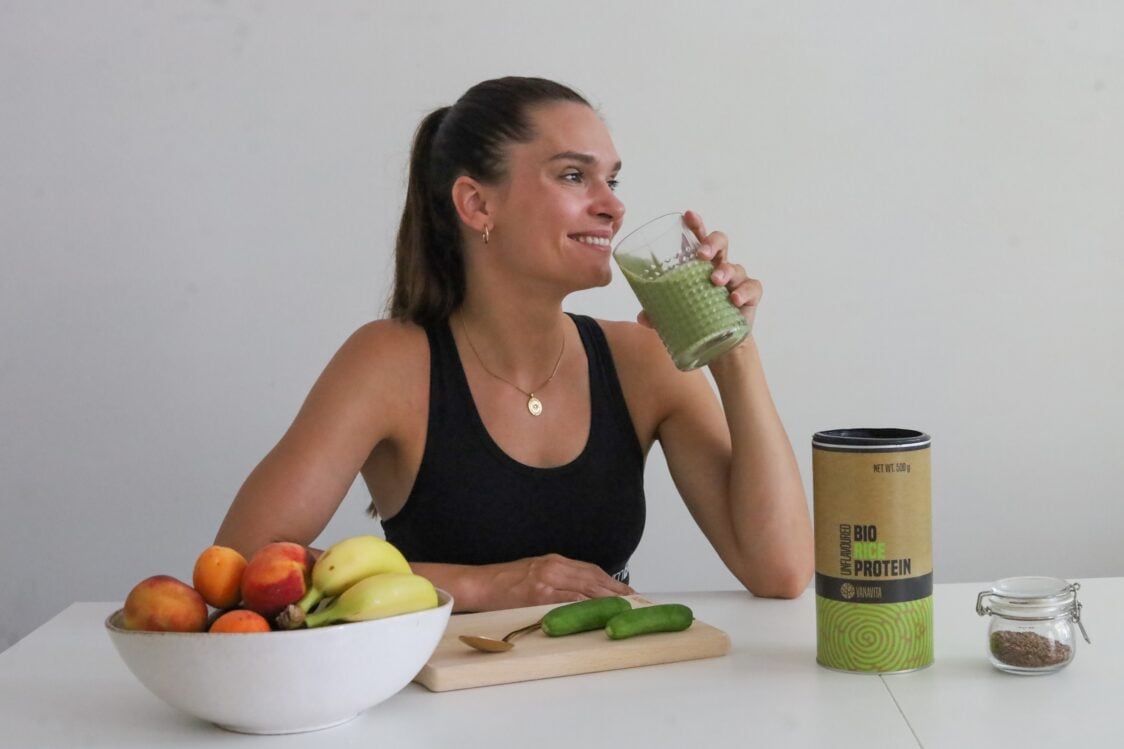
6 benefits of a pre-workout meal
1. Provides energy for your workout
The most efficient source of energy for athletic performance is carbohydrates. During workouts, it is easiest for your body to use blood sugar (glucose). Once it starts to run out, it switches for the most part to burning stored carbohydrates or glycogen.[2]
A pre-workout meal with carbohydrates will quickly provide the available energy for your workout. Thanks to this, you can exercise for longer, at a higher intensity and can reach your full potential. The function of carbohydrates from a pre-workout meal as a source of energy is even more important for workouts that last longer than 45 minutes. Likewise after a prolonged fast, for example after an 8-hour sleep. [1]
2. May help delay fatigue
Everyone has experienced a drop in energy during a workout. Suddenly you don’t have the strength left for the next repetition or you feel like you can’t even run 10 metres anymore. This happens most often when your muscle glycogen stores run out and your body switches to burning fat. However, this energy system is more complex, which can slow you down. It’s like switching from a sports car to a city car with less power.
A number of factors influence when a lack of energy catches up with you, such as the previous day’s diet, the food you ate before the workout, the intensity of the workout, or what you did hours before. However, if you make sure your pre-workout meal has sufficient carbohydrates, you’ll replenish your available energy quickly. You’ll delay the feeling of fatigue while saving your energy stores in the form of muscle glycogen for later in your workout. [3]

3. Promotes muscle protection
Protein from pre-workout meals is mainly associated with muscle protection. While this nutrient is more often addressed after exercise to aid recovery, it also has its place and purpose during the pre-workout period. With protein, you replenish amino acids, which are the building blocks of muscle mass. You will thus support an anabolic environment in which the formation of muscle mass prevails over its breakdown (catabolism). In addition, some amino acids, such as BCAAs, can serve as a source of energy needed for athletic performance. As a result, you reduce the risk of the body using muscle mass as an energy source. [3–4]
4. Contributes to the regulation of body temperature
Sports performance is influenced not only by food, but also by fluid intake. Adequate hydration is important for proper muscle and joint function, but also for body temperature regulation. Dehydration, on the other hand, can lead to overheating, feeling tired and weak. However, this does not mean that you should pour two litres of water into yourself just before a workout. Fluids need to be replenished continuously. [5, 8]
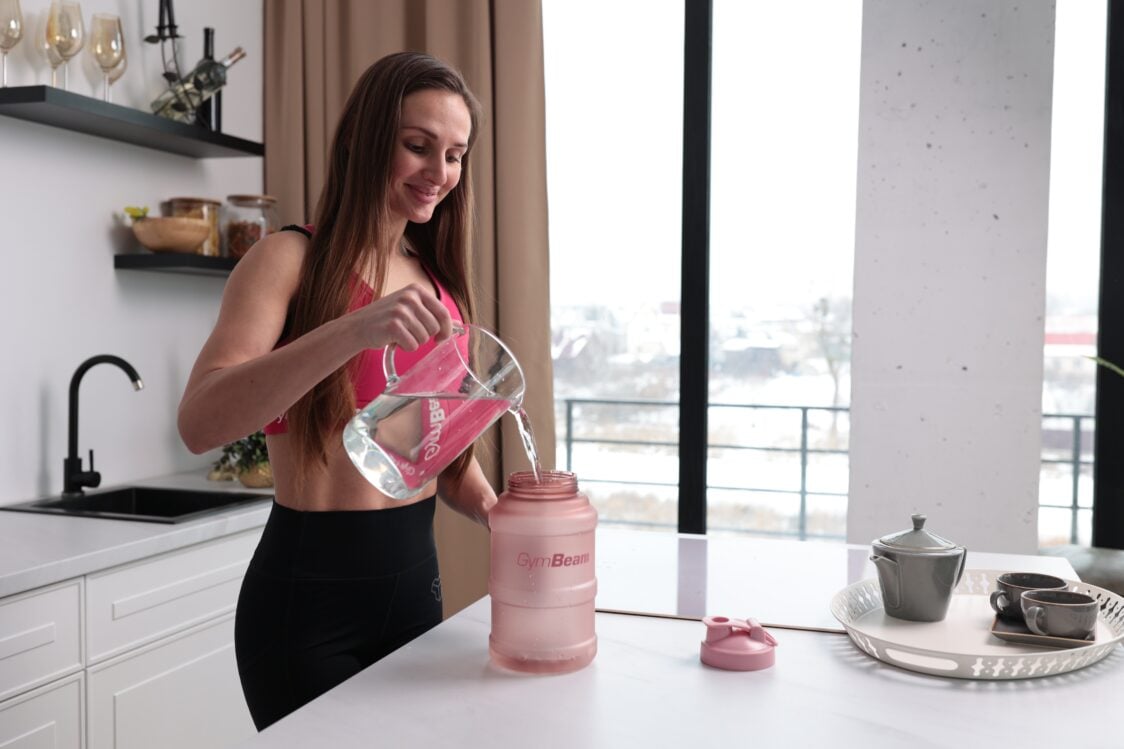
5. Supports regeneration
A pre-workout meal can also support recovery after your workout. By not having to dip into your own energy reserves as much, the body will replenish what it needs more quickly after exercising. It can then use the amino acids from the protein immediately to repair the muscles strained by the workout. Adequate hydration also plays a key role here, which helps to more efficiently flush out waste substances produced by the metabolism of energy during exercise. Better recovery can thus be felt in terms of reduced post-workout muscle soreness, or DOMS (Delayed Onset Muscle Soreness). [6]
6. Supports your targets
A well-chosen pre-workout meal can boost your athletic performance. By being able to exercise longer and harder, you will burn more calories and promote weight loss. At the same time, your muscles will get a bigger boost, which in turn will be appreciated by strength athletes who want to build muscle mass. In turn, endurance athletes benefit from delayed fatigue, allowing them to train longer and at a higher intensity. However, other athletes who are involved in team or competitive disciplines will also benefit. [7–8]

What food should (not) be included in a pre-workout meal?
How to replenish energy before a workout to obtain all the benefits mentioned above? Ideally, by preparing a complex, yet easily digestible meal. The goal is to take in the optimum amount of energy and nutrients, but at the same time not overload the digestive tract for too long.
Thus, a pre-workout meal typically contains a higher proportion of carbohydrates and a smaller portion of protein and fat. Each of these nutrients has its own function and you will find suitable and less suitable sources. However, individual tolerance and preference has the final say in choosing a particular meal. In fact, everyone may prefer something different before a workout. [2]
Which factors influence pre-workout food?
- daily energy and nutrient requirements for athletes
- food from the previous day
- overall meal allocation for the day
- duration and intensity of the workout
- supplementation during and after workouts
- workout time
- individual preference
Are you also wondering what your post-workout meal should contain? Find out in our article What to Eat After a Workout? The Best Meals and Supplements for Bodybuilders and Endurance Athletes.
You might be interested in these products:
1. Carbs before a workout
- Main function: Source of energy for power.
- Recommended amount: 1-4 g/kg body weight 1-4 hours before working out. This means that you can give yourself, for example, 4 g/kg four hours before exercise or 1 g/kg an hour before the start of your workout. Adjust the amount of carbohydrates to the time, but also to the duration of the workout. For example, if you go for a 2-hour run, you will need a larger amount than if you go to the gym for an hour. [9–10]
Suitable sources of carbohydrates before working out
- If you’re not going to work out for an hour or more, feel free to have complex carbohydrates, which release energy gradually.
- If you have less than an hour before your workout, choose simple carbohydrates (sugars) that don’t put as much strain on digestion.
However, keep in mind that sugars should not make up more than 10% of your total energy intake. The exception is athletes, who can usually afford to eat a higher amount of simple sugars due to their higher energy expenditure.
- Complex carbohydrates: Oatmeal, rice, pasta, bread, bulgur, couscous, quinoa, rice cakes, instant porridge, tortilla, granola.
- Simple carbohydrates: Fruit, fruit snacks, honey, energy gel, glucose or dextrose.
Inappropriate sources of carbohydrates before working out
On the other hand, foods that have a higher proportion of fat are less suitable before working out. These take a little longer to digest and could cause digestive problems during your workout.
- sweets (biscuits, chocolate, wafers), chocolate-covered nuts, sweet pastries (croissants, homemade buns, cakes), ice cream
If you want to have something sweet once in a while before a workout, fruit jelly candies, for example, are a better option as they are quickly digested.
Want to learn how carbohydrates work in the body? Then you shouldn’t miss this article Carbohydrates: Classification, Sources, Digestion, Functions in the Body and Optimal Intake.
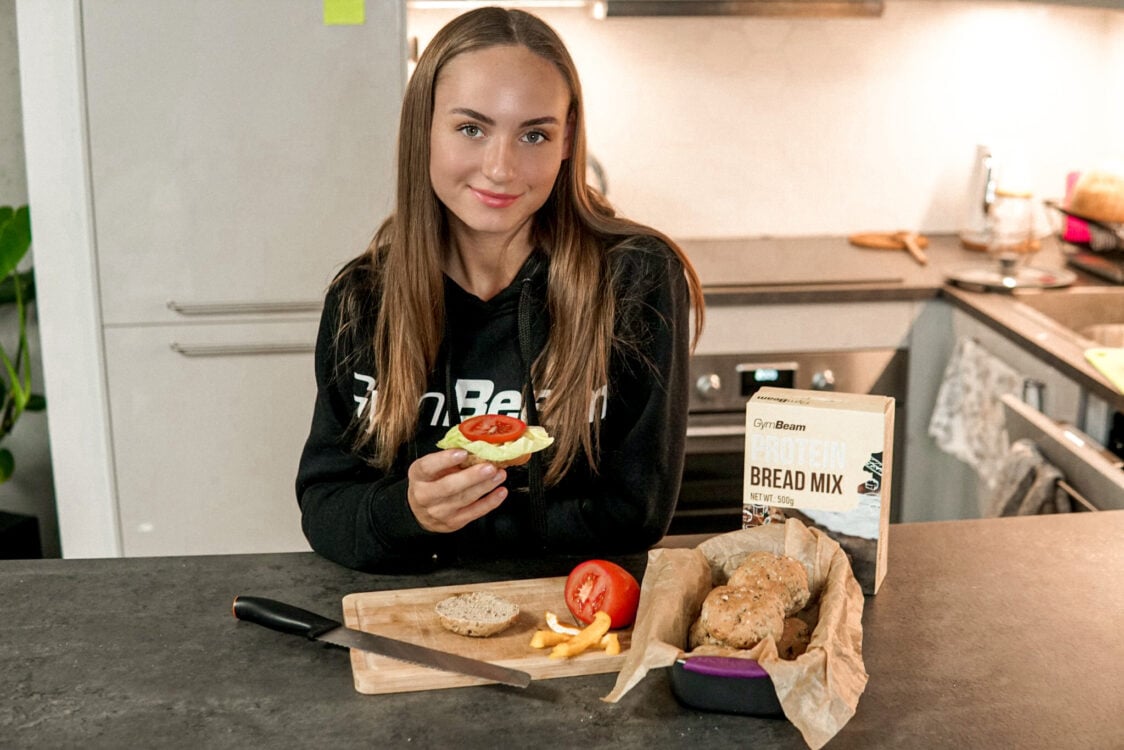
2. Protein before a workout
- Main function: protection of muscle mass, supports regeneration.
- Recommended amount: There is no uniform recommendation yet, but most people are satisfied with a serving of 10-25 g of protein at least one hour before a workout. It is more important to maintain your daily protein intake, which for athletes ranges from 1.4-2 g/kg body weight. [9]
Suitable sources of protein before working out
Before exercising, it is crucial to choose foods that are high in protein and low in fat.
- lean meat (chicken, turkey breast), fish (tuna in brine, salmon, cod), seafood (prawns), dairy products (white yoghurt, low or semi-fat quark, hard cottage cheese with lower fat content), lean ham, eggs or egg whites, tofu, tempeh, seitan, protein, protein bars.
Inappropriate sources of protein before working out
Avoid protein with a higher fat content about 2 hours before training.
- fatty meats (pork neck, prime beef, minced meat), offal, fatty dairy products (creamy and mouldy cheeses, creamy yoghurt), fried meats, cold cuts (sausages, sliced meats), vegan burger alternatives
Some people may also have a hard time tolerating legumes (lentils, peas, beans, chickpeas) before a workout, which are a great source of plant protein but also have a high amount of fibre. The latter can cause problems especially for people with more sensitive digestion.
Are you also curious about what protein intake is appropriate for you based on your goal? Find out in our article How Much Protein to Eat for Muscle Growth, Weight Loss, Endurance Training or Pregnancy?
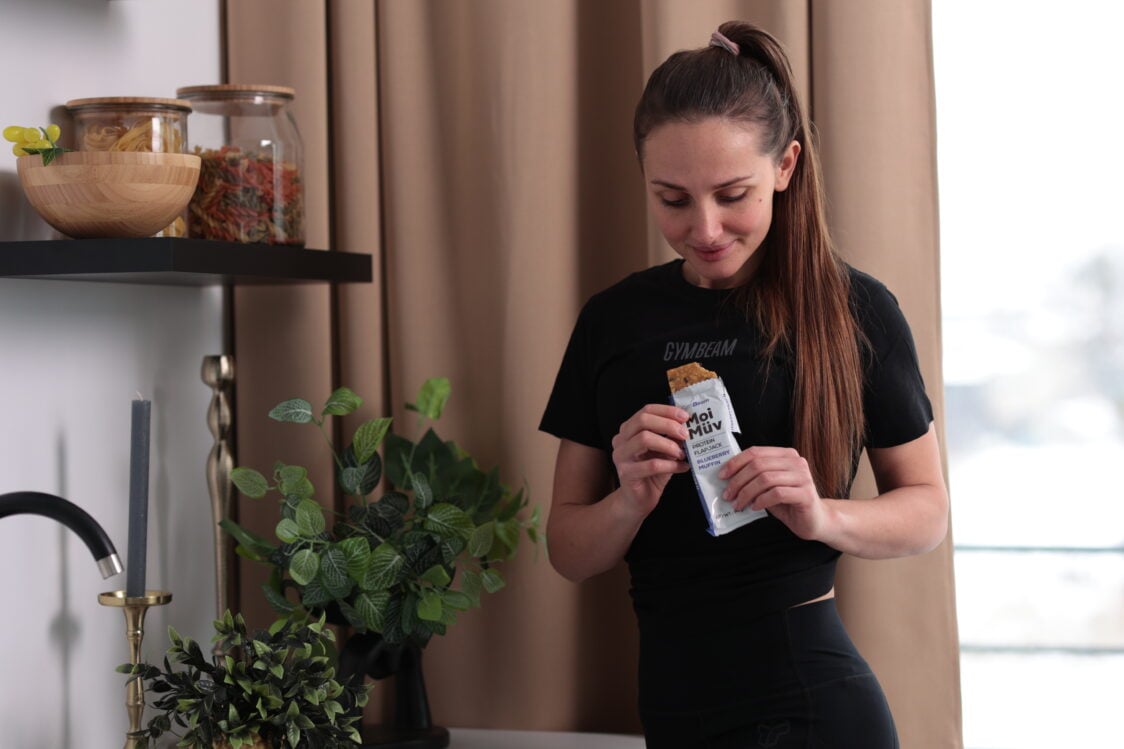
3. Fats before a workout
- Main function: Source of energy for long, low-intensity endurance exercise (e.g. longer rides or runs). Shorter strength exercises (up to 45 minutes) or HIIT, for example, can usually be done without any fat in a pre-workout meal. In addition, the body can also draw on its own fat stores.
- Recommended amount: There is no uniform recommendation yet, but 5-15 g per serving at least one hour before a workout is typically well tolerated. [11]
Suitable sources of fat before working out
When adding fat to your food, consider that most protein foods naturally contain fat (meat, dairy, eggs). In these cases, sometimes there is no need to add another source of this macronutrient.
Endurance athletes in particular have taken a liking to MCT oil in recent years. Unlike conventional oils, they are quickly digested and the body can immediately use them as a source of energy that lasts for long workout sessions. However, they may not suit everyone and it is advisable to test their tolerance by using a small amount first. However, in a small serving you can also add other sources of fat to your meal.
- olive, canola, coconut, flaxseed or avocado oil, nuts and seeds, nut butters
Inappropriate sources of fat before working out
In the case of pre-workout fats, it’s more often the quantity that’s the problem rather than the specific source. Fats themselves are digested more slowly, plus they could slow down the absorption of carbohydrates and other nutrients. Undigested food in the stomach can then cause serious digestive problems during a workout, negatively affecting it, or the athlete may not even be able to complete it. In addition to quantity, it is also necessary to watch the source of fats and watch your intake of saturated fats and trans fats in particular, which are often associated with a higher risk of cardiovascular disease.
- lard, bacon, cream, fast food, ready-made food, solidified fats (sweets, chocolate toppings, filled biscuits), fried food
If you want to learn more about the function of fats in your diet and suitable sources, read our article Healthy and Unhealthy Fats: Which Foods to Eat and Which to Avoid?
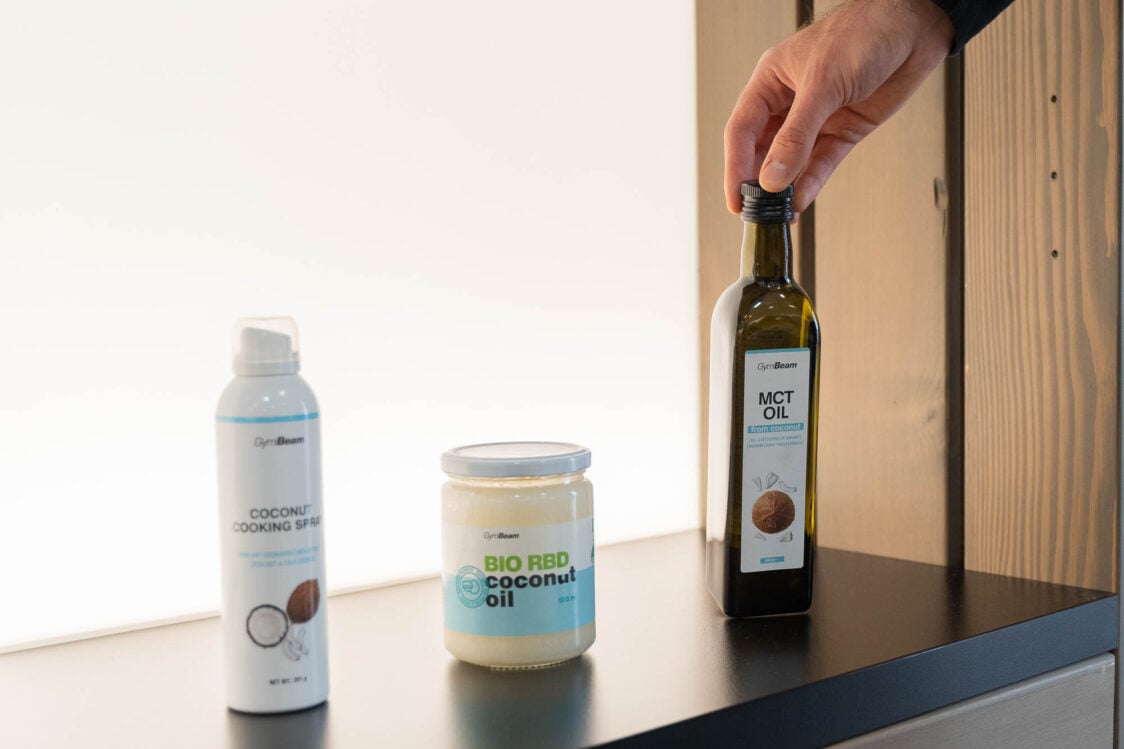
4. Fluids before working out
- Main function: To maintain adequate hydration, which is crucial for muscle function, thermoregulation and overall physical performance.
- Recommended amount: 500 ml of fluid two hours before working out and then 125-250 ml of water 10-20 minutes before the workout. In case of warm weather or long endurance activities, it is recommended to drink more. In total, everybody should drink 30-45 ml of water per kg of body weight per day. [12–13]
Suitable pre-workout beverages
Before a classic strength training session, plain water is usually enough. However, if you are preparing for a long endurance activity (long run, cycling), you can also support hydration with an ion supply drink with electrolytes. Most athletes are comfortable with an isotonic drink that has the optimal ratio of electrolytes to carbohydrates. With sugary drinks (juice), you need to take into account that you will also be ingesting sugars, which should also be included in your total carbohydrate intake before a workout.
- water, tea, diluted juice, ion supply drinks (isotonic), coconut water
Want to learn more about sports drinks and their use in various activities? Read our article Sports Drinks: When to Drink an Ionic Drink and During Which Activities Is Water Enough?
Inappropriate pre-workout drinks
- alcohol, juice, lemonade, sparkling water (just before a workout – risk of bloating), milkshakes
If you are wondering why a sufficient fluid intake is so important and what dehydration can cause, read our article How Not Drinking Enough Fluid Affects Your Health.
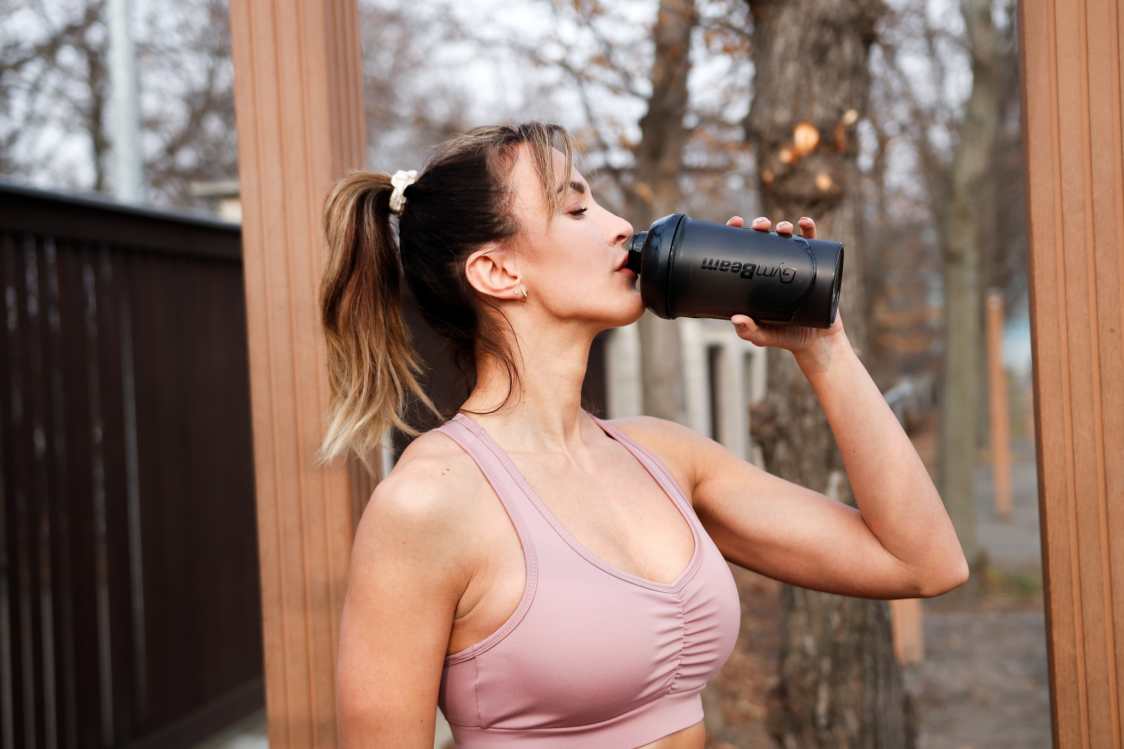
Pre-workout meals for weight loss
Maybe you’re also wondering what to eat before a workout when you’re trying to lose weight? Many people still believe that they will do best if they workout in the morning on an empty stomach while losing weight. From this they are hoping for an increased burning of body fat and a faster metabolism during the day.
Unfortunately, studies do not confirm these effects. The failure of this method may be due to the fact that without a prior meal, you cannot perform as well as if you had eaten before working out. You may feel weaker and more fatigued sooner. In addition, you may get hungry after a workout and end up eating more food overall during the day than if you had eaten before the workout. Thus, you may not be able to meet the main criterion for weight loss, which is to be in a calorie deficit (energy expenditure is higher than energy intake). But there are still exceptions, and some really enjoy training fasted and get better results than if they eat. This again confirms the need for nutrition to be personalised in all aspects.[14–15]
And so what to eat before working out early in the morning? If you have a workout first thing after waking up, try to at least eat a small meal before it. This could be a banana, toast or rice cake with a slice of ham or low-fat yoghurt. This will give you at least a little energy, probably make your workout more enjoyable and produce a better performance. In case you are unable to even get a piece of banana into you, focus on the last meal of the previous day (dinner, second dinner). This should contain a higher proportion of carbohydrates, which you can then use as an energy source for your morning workout.
If you are interested in how to lose weight, you should definitely not miss our article The Simple Basics of Weight Loss: You Will Be Surprised What’s Really Important.

Pre-workout meals for muscle growth
Nutritional timing is also addressed by bodybuilders and strength athletes who want to support muscle growth with appropriately chosen meals around their training. Fasted workouts are usually avoided because they want to prevent catabolism, i.e. muscle burning. Therefore, they try to eat at least a small meal containing both carbohydrates and protein before working out. However, they pay more attention to the post-exercise meal, which they consume within the anabolic window to maximise recovery.
However, according to current studies, it seems that pre-workout food has a similar effect on muscle growth as does post-workout food. The key is to eat enough protein within a few hours around your workout and meet your total daily intake. This way, there’s no need to focus too much on having to run to the locker room right after your workout and drink a post-workout protein or gainer so you don’t accidentally miss out on the earned gains. Simply have your protein or complex meal at home. [16]
Want to learn more about how to gain muscle? Learn all about the training and nutrition in our article What to Eat and How to Exercise to Finally Gain Muscle?
Discover our bestsellers:
Tips on pre-workout meals
Preparing a pre-workout meal doesn’t have to be lengthy or complicated. You can choose from sweet and savoury options, as well as finding inspiration from our pre-workout snacks. Adjust your meal portion to the time of day, pre-workout time and daily energy intake.
1. Pre-workout porridge
Porridge is based on oatmeal, quinoa, instant rice or buckwheat. They are simple to prepare, easy to digest, and when you mix in a protein, a piece of your favourite fruit and a spoonful of peanut butter, you have a complete meal. Rice porridge is the fastest to digest and is well tolerated even an hour before a workout.
Take inspiration from our recipes:
- oatmeal with protein, peanut butter and fruit
- rice porridge that’s ready in seconds
- baked brownie porridge
- semolina porridge
- savoury porridge with egg
- quinoa porridge with apple
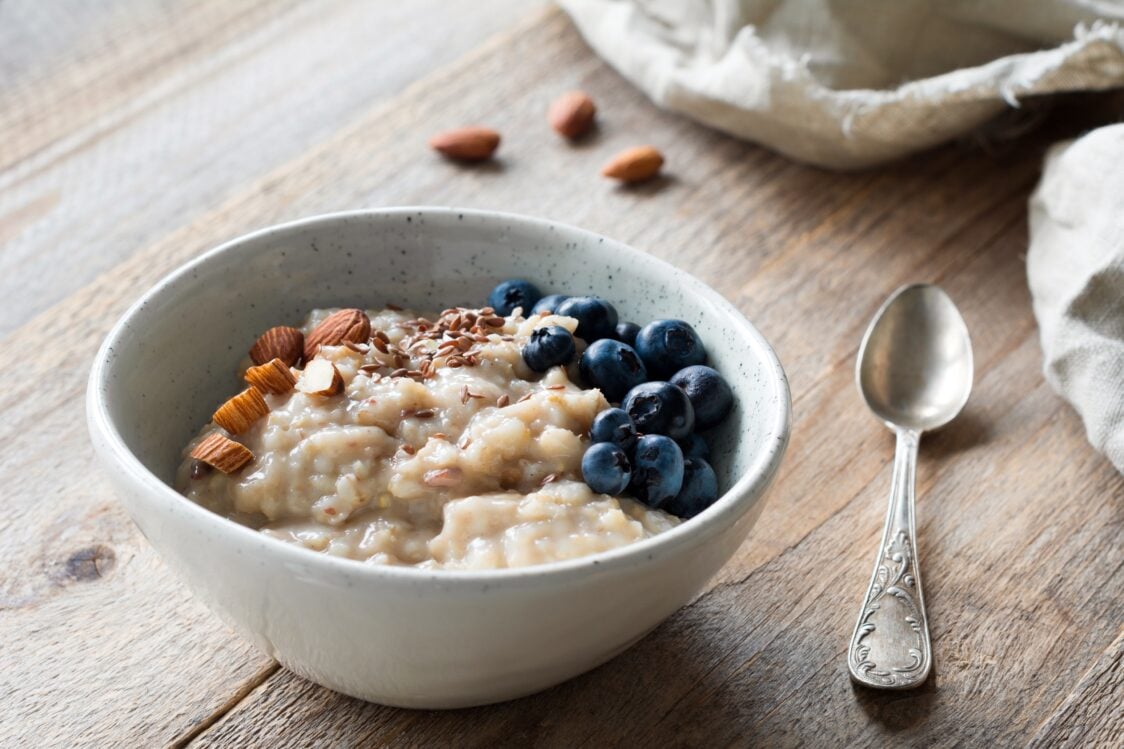
2. Eggs with bread and vegetables
Eggs are a favourite food with a high content of valuable nutrients. However, they have a higher fat content in the yolk, so it is better to combine whole eggs with pure egg whites. Prepare them boiled or scrambled. An omelette is also great, or you could try egg muffins. Add wholemeal bread as a source of carbohydrates and add some fresh vegetables to your meal. It’s best to have your meal with eggs no later than 2 hours before your workout, as egg protein takes a little longer to digest than whey.
Take inspiration from our recipes:
If you’re wondering what eggs contain and what their benefits are, read our article 10 Reasons to Eat Eggs.
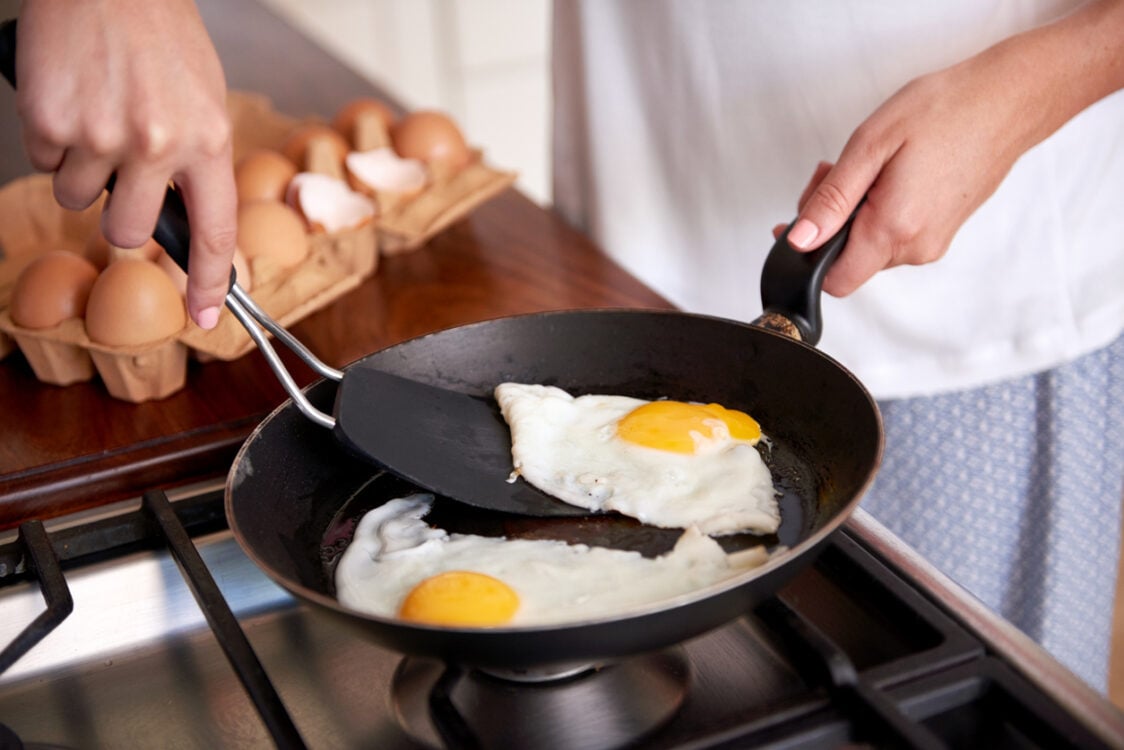
3. Yoghurt with muesli or granola and fruit
There’s nothing easier than grabbing 0% white or Greek yoghurt from the fridge, topping it with your favourite granola or muesli and throwing in a sliced banana. In no time, you’ll have a tasty snack ready to give you a boost of energy before your workout. Oatmeal with a few nuts and freeze-dried fruit is also great in yoghurt.
Be inspired with our recipes:
- frozen yoghurt with fruit, chocolate granola and nuts
- homemade nut granola
- crunchy granola with nuts and quinoa
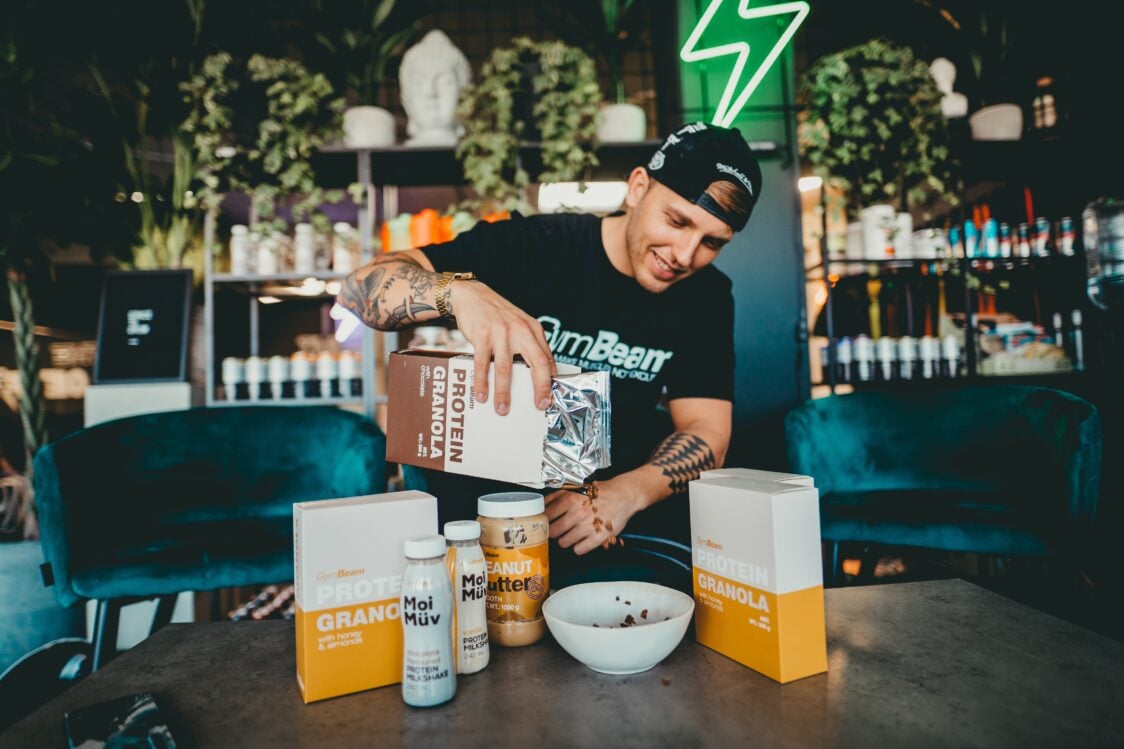
4. Fruit smoothie with protein, yoghurt or quark
A smoothie is the perfect choice when you don’t have time to prepare a larger meal but need an easily digestible source of nutrients. But be careful not to forget anything or overdo it with the amount of fruit or fat.
How to prepare a balanced smoothie?
- Choose a liquid – plain water, milk, a plant-based drink (almond, soy, rice) or coconut water.
- Add one serving of fruit – banana, kiwi, pear, peach, blueberries, raspberries.
- Add protein – protein, low-fat yogurt or quark.
- Select a source of fat – peanut, almond, cashew or other nut butters.
- Flavour as desired – cinnamon, cocoa, low-calorie syrup or other sweetener.
Be inspired with our recipes:
- refreshing forest fruit protein smoothie
- banana-peanut smoothie
- a smoothie that tastes like carrot cake
- 3 smoothies recipe
All you need to know about how to prepare a nutritionally balanced smoothie can be found in our article How to Prepare a Healthy and Nutritious Smoothie Step by Step.
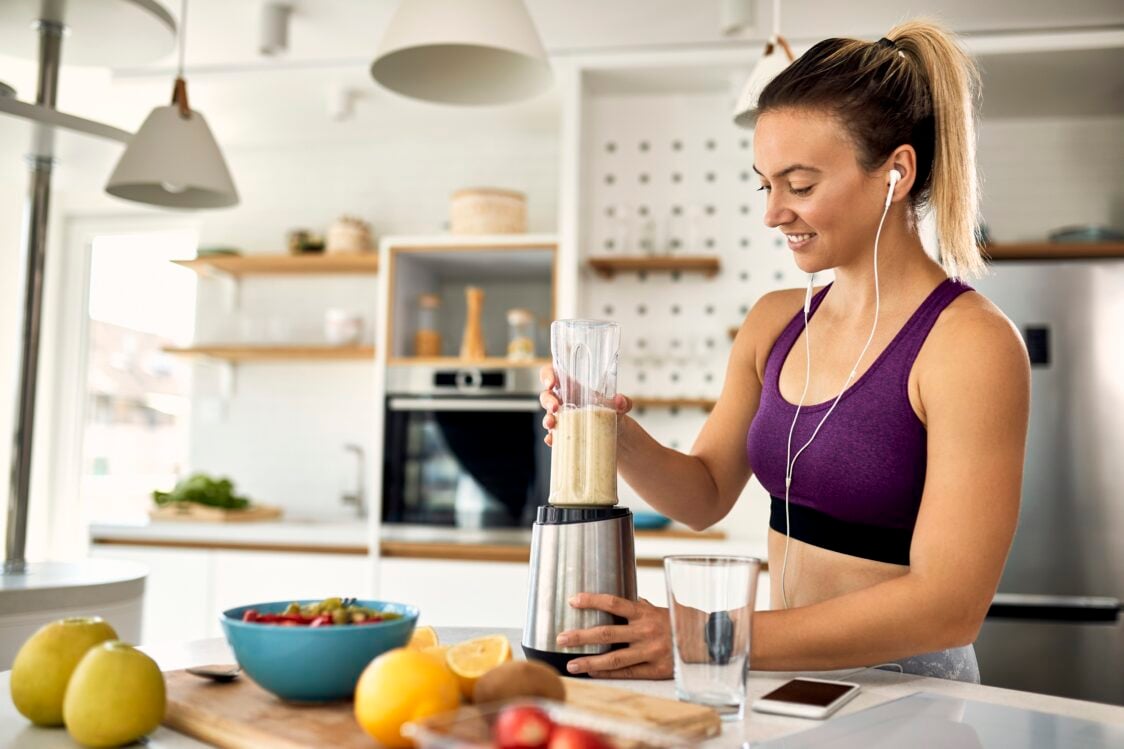
5. Protein waffles or pancakes with fruit
If you’re a lover of sweet foods, pancakes or waffles enriched with protein or other protein will surely please your palate. For the quickest and easiest preparation, reach for a protein waffle or pancake mix. Serve them with yoghurt, a dollop of nut butter and fresh fruit or jam.
Be inspired with our recipes:
- fluffy pancakes 3 way
- oatmeal banana pancakes
- kefir pancakes packed with protein
- spelt pancakes
- baked pancakes with quark
6. Bread with quality ham, cheese or spread
You’ll appreciate a sliced bread or bagel with cheese or spread when you don’t have time to prepare a hot meal. High-quality ham, low-fat cheese or sliced tofu are perfect on bread. But homemade spreads are also great and can be made with tuna, sardines or eggs. Just watch out for the amount of fat you add to the spreads, as well as flavourings such as onion, garlic or fish, which can cause bloating and other digestive problems for more sensitive individuals during workouts. Always be guided by your personal tolerance.
Be inspired with our recipes:
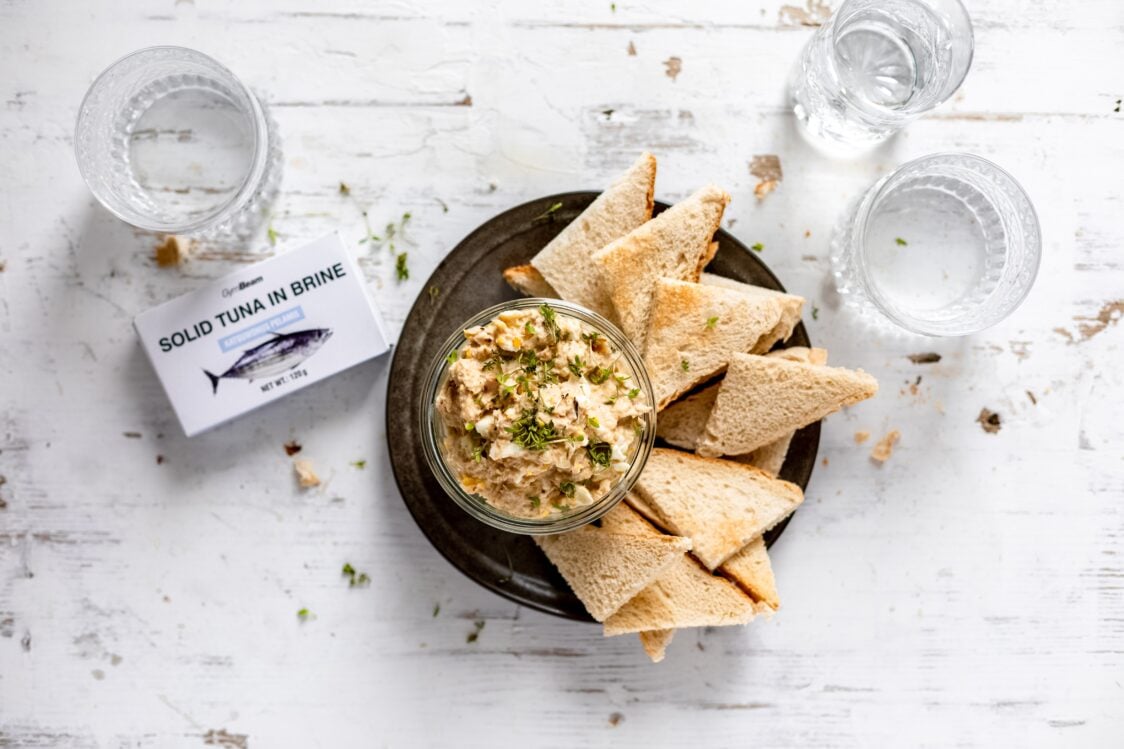
7. Lean meat or fish with a side dish and vegetables
You don’t have to solely rotate between sweet or cold meals before your workout. Easily digestible hot meals are also suitable, which you can prepare within 30 minutes. In case you are unable to cook before your workout, prepare your food ahead of time in a food box and then simply reheat it. However, you can also try Ready To Eat FIT meals suitable for athletes, which you can just heat up and eat.
Be inspired with our recipes:
- succulent chicken breast in orange sauce
- Asian prawns with rice
- creamy tagliatelle pasta with salmon and ricotta
- chicken teriyaki
8. Plant-based meat alternatives with side dishes and vegetables
You will appreciate these dishes, whether you are a fan of a plant-based diet or just like to diversify your meals. You could try tofu, tempeh or seitan. The advantage is that you don’t have to cook tofu or tempeh. However, they usually taste better sautéed in a pan with spices and vegetables. Quinoa, rice, pasta or gnocchi are also good.
Be inspired with our recipes:
- pumpkin curry with roasted tofu and jasmine rice
- pad Thai noodles with tempeh and fresh vegetables
- spaghetti with tempeh and tomato sauce
- seitan noodles with broccoli
If you want to include vegan meat substitutes in your diet more often, you should not miss our article Plant-Based Meat Alternatives: Which are Best, How Much Protein Do They Contain and Can They Fully Replace Meat
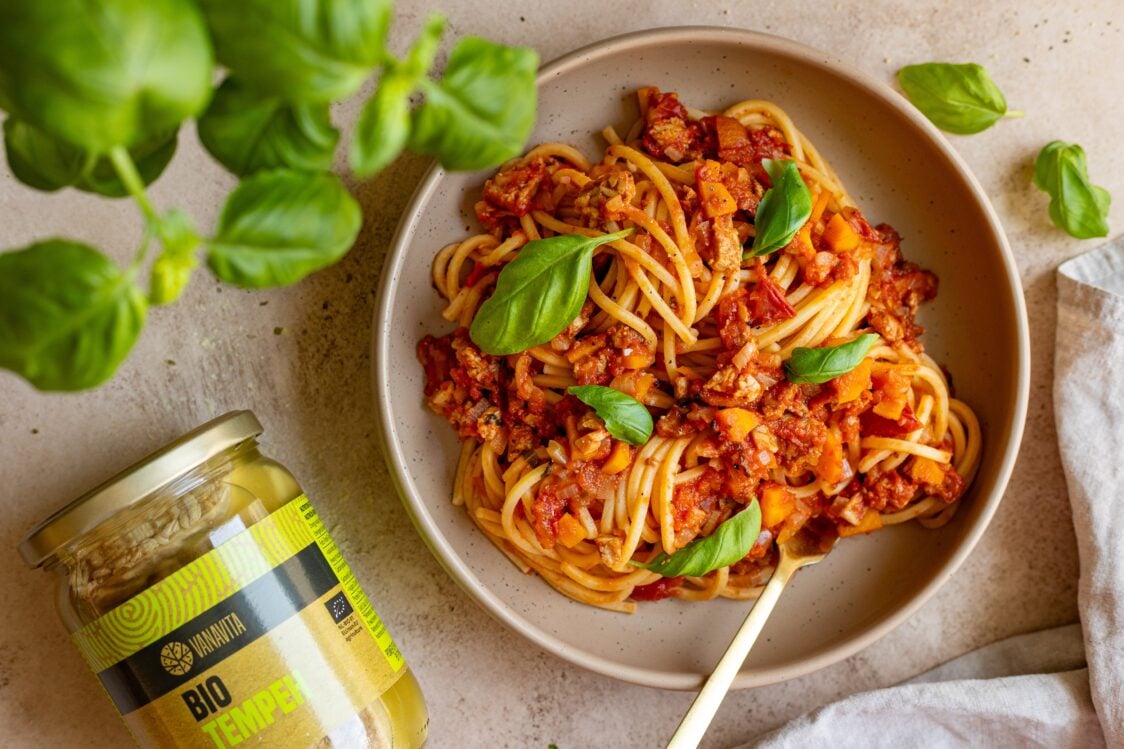
9. Stuffed tortilla
You can also prepare a tasty wrap in a few minutes before your workout. Just take a tortilla, wrap it with roast chicken, tuna, tofu, chopped vegetables, add yogurt or avocado dip and you’re done. If you add cheese to the wrap and let it bake for a while in a panini grill, oven or microwave, you have an even bigger treat. Again though, be careful of the fat content, for example, a large serving of mayonnaise dressing is probably not a good idea.
Be inspired with our recipes:
- folded tortilla wrap
- tuna wrap with avocado dip and vegetables
- quesadilla with tuna and tomato salsa
- tortilla wrap with tofu
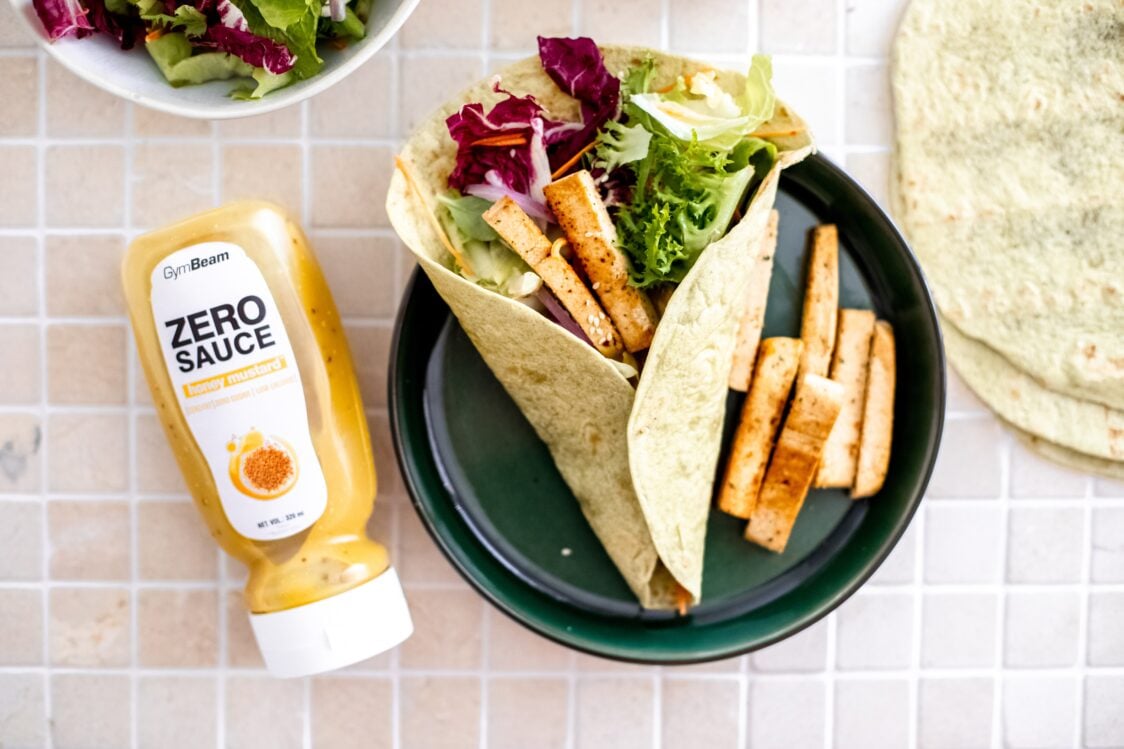
10. Fitness cake or mug cake
Before you go for a run or to the gym, you can also enjoy a healthy dessert. If you make it with wholemeal flour, use less fat and sugar and add some protein in the form of a protein powder or quark, you’ll have a healthy and nutritious meal.
Be inspired with our recipes:
- moist carrot cake packed full of protein
- a healthier mole cake in a glass
- vanilla cottage cheesecake
- oat cake with blueberries
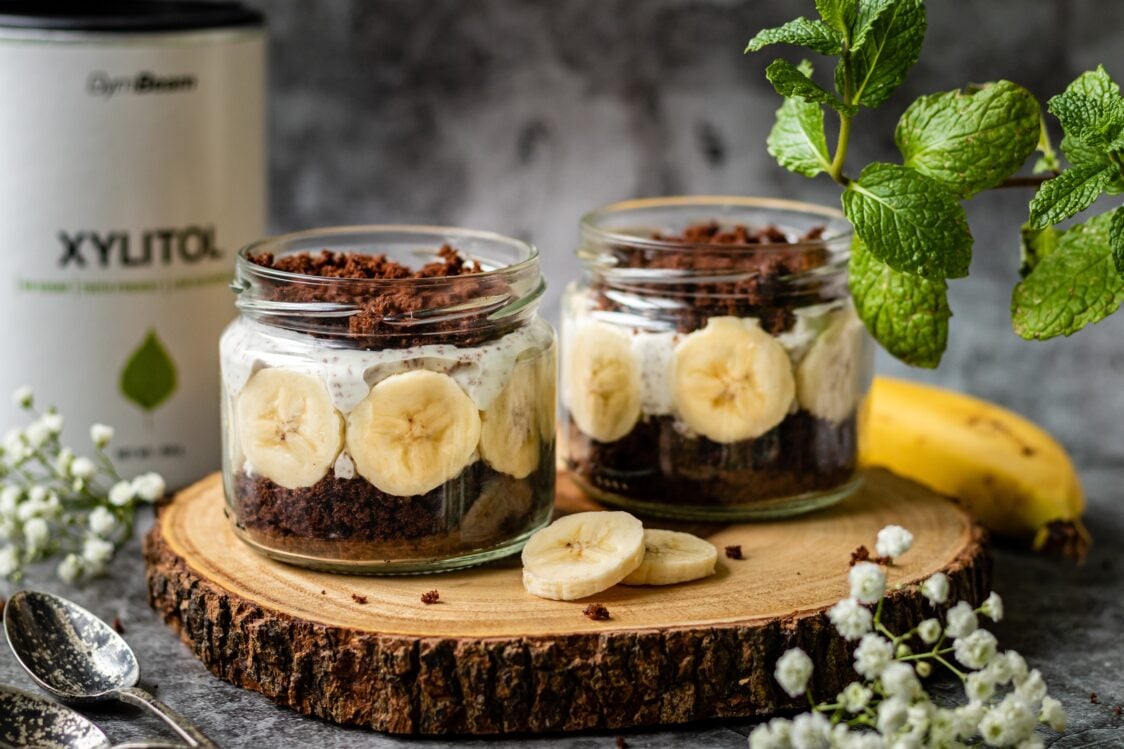
11. Bonus point: Pre-workout snacks
Meal replacements or various snacks containing both carbohydrates and protein are a great way to quickly replenish energy before a workout. You can carry them in your sports bag and have them available at any time. But always keep an eye on the ingredients in these goodies. Sometimes they have too much fat or may be lacking in some nutrients, but you can solve this by adding protein or fruit. You can, however, prepare pre-workout snacks at home to keep an eye on the ingredients.
Tips for pre-workout snacks:
What foods prior to working out are not suitable?
As mentioned above, about 2 hours before your workout, you should avoid high-fat and high-fibre foods. Especially in the case of high intensity training, they could cause digestive problems and negatively affect your entire workout.
- High-fat foods: Fried foods, fatty meats, pizza, desserts, cakes, cream sauces, foods with a mayonnaise dressing.
- High-fibre foods: Lentil salad, chickpea curry with coconut milk, large vegetable salad, bean soup, seed bread.

How to time your pre-workout meal correctly?
Sometimes it is difficult to time your pre-workout meal so that you can complete digestion, but at the same time don’t get hungry before your workout. You know it’s probably good for you to eat before your morning workout. Likewise, don’t forget to snack before your evening workout. Let’s take a look at what such nutritional timing might look like.
- 3 hours or more before training: in this case, you can have a normal lunch or other larger meal.
- 1-2 hours before training: a complex, easily digestible meal with a majority of carbs and less protein and fat. This can be a larger snack or a smaller serving of a main meal.
- Less than 1 hour before training: an easily digestible carb meal such as a banana, fruit snack, rice porridge with honey or toast with jam.
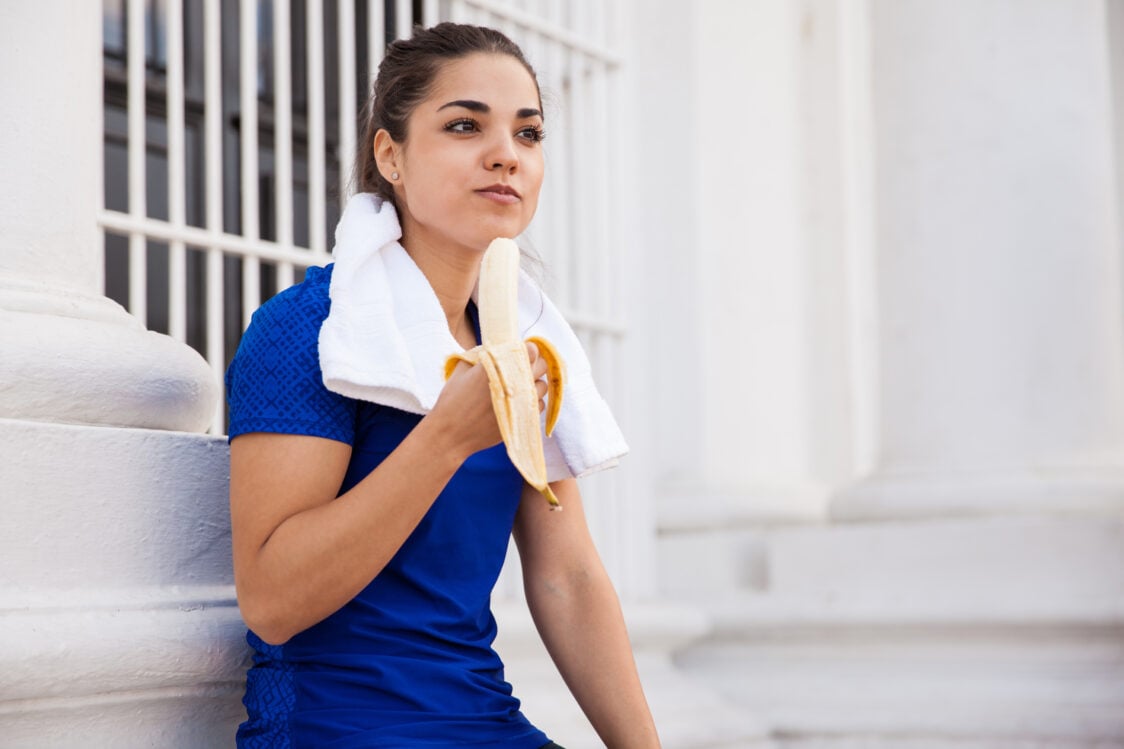
Which supplements are suitable before working out?
You can also support your athletic performance by choosing the right pre-workout supplements.
- Caffeine: The most popular kick-starter that gets you pumped up and raring to go.
- NO supplements: Citrulline or arginine will help with blood flow and pumping of the muscles.
- Beta-alanine: It forms carnosine, which helps reduce muscle acidity.
- Complex pre-workouts: These contain a mixture of substances that can support athletic performance.
- EAA or BCAA: Complex amino acids that serve as building blocks for muscle growth and the body can also use them as an energy source.
- Maltodextrin and other quick carbs: Provide instant energy before a workout.
- Gainers and carbs: A complex source of fast and slow carbohydrates, proteins and other functional substances.
If you want to learn more about pre-workout supplements, read our article How to Select and Use the Most Effective Booster.
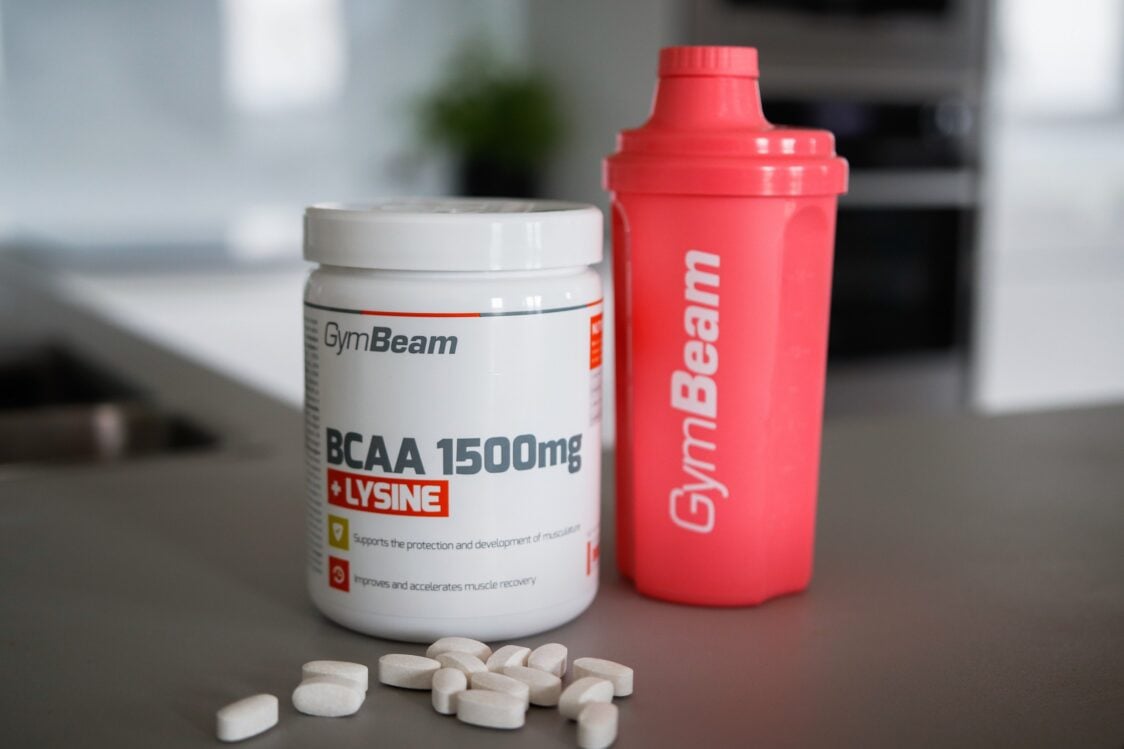
What should you remember?
A well-prepared pre-workout meal will give you the energy to perform, help delay fatigue and promote muscle growth. However, always make sure to consider which ingredients it contains. First and foremost, it should not be lacking in carbohydrates, which are the main source of energy for athletic performance. Then also add a portion of good quality protein and a smaller portion of fat. Plan the size of your meal according to how long you expect to workout for. However, you can also support your athletic performance with pre-workout supplements such as caffeine, citrulline or BCAAs.
If you liked this article and found it useful, please share it with your friends. They will also appreciate these tips on how to eat before working out.
[1] King, A., Helms, E., Zinn, C., & Jukic, I. The Ergogenic Effects of Acute Carbohydrate Feeding on Resistance Exercise Performance: A Systematic Review and Meta-analysis. – https://doi.org/10.1007/s40279-022-01716-w
[2] Kaminski, J. What to Eat Before a Workout: Preworkout Nutrition Tips. – https://blog.nasm.org/what-to-eat-before-a-workout
[3] Fuel Up: The Importance of Eating Before a Workout. – https://blog.insidetracker.com/fuel-up-the-importance-of-eating-before-a-workout
[4] Cintineo, H. P., Arent, M. A., Antonio, J., & Arent, S. M. Effects of Protein Supplementation on Performance and Recovery in Resistance and Endurance Training. – https://doi.org/10.3389/fnut.2018.00083
[5] Meal Timing: What and When to Eat for Performance and Recovery. – https://www.acefitness.org/resources/pros/expert-articles/6390/meal-timing-what-and-when-to-eat-for-performance-and-recovery/
[6] Kaminski, J. Muscle Soreness & DOMS: How to Prevent & Treat Sore Muscles. – https://blog.nasm.org/doms-muscle-sorenes
[7] Ormsbee, M. J., Bach, C. W., & Baur, D. A.. Pre-Exercise Nutrition: The Role of Macronutrients, Modified Starches and Supplements on Metabolism and Endurance Performance. – https://doi.org/10.3390/nu6051782
[8] Human Kinetics. Nutrition Before Resistance Training. – https://us.humankinetics.com/blogs/excerpt/nutrition-before-resistance-training
[9] Kerksick, C. M., Arent, S., Schoenfeld, B. J., Stout, J. R., Campbell, B., Wilborn, C. D., Taylor, L., Kalman, D., Smith-Ryan, A. E., Kreider, R. B., Willoughby, D., Arciero, P. J., VanDusseldorp, T. A., Ormsbee, M. J., Wildman, R., Greenwood, M., Ziegenfuss, T. N., Aragon, A. A., & Antonio, J. International society of sports nutrition position stand: Nutrient timing. – https://doi.org/10.1186/s12970-017-0189-4
[10] Thomas, D. T., Erdman, K. A., & Burke, L. M. American College of Sports Medicine Joint Position Statement. Nutrition and Athletic Performance. – https://doi.org/10.1249/MSS.0000000000000852
[11] Transparent Labs. Evidence-Based Pre-Workout Nutrition: What’s the Optimal Fuel for Your. – https://www.transparentlabs.com/blogs/all/pre-workout-nutrition-how-to-fuel-your-body
[12] Nutrition and Supplement Update for the Endurance Athlete: Review and Recommendations. – https://www.ncbi.nlm.nih.gov/pmc/articles/PMC6628334/
[13] Doane. Hydratation guidelines.– https://www.nata.org/sites/default/files/hydration-guidelines_handout.pdf
[14] Frampton, J., Edinburgh, R. M., Ogden, H. B., Gonzalez, J. T., & Chambers, E. S. The acute effect of fasted exercise on energy intake, energy expenditure, subjective hunger and gastrointestinal hormone release compared to fed exercise in healthy individuals: A systematic review and network meta-analysis.– https://doi.org/10.1038/s41366-021-00993-1
[15] Hackett, D., & Hagstrom, A. D. Effect of Overnight Fasted Exercise on Weight Loss and Body Composition: A Systematic Review and Meta-Analysis. – https://doi.org/10.3390/jfmk2040043
[16] Schoenfeld, B. J., Aragon, A., Wilborn, C., Urbina, S. L., Hayward, S. E., & Krieger, J. Pre- versus post-exercise protein intake has similar effects on muscular adaptations. – https://doi.org/10.7717/peerj.2825

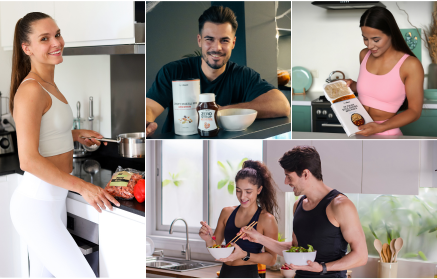
Add a comment